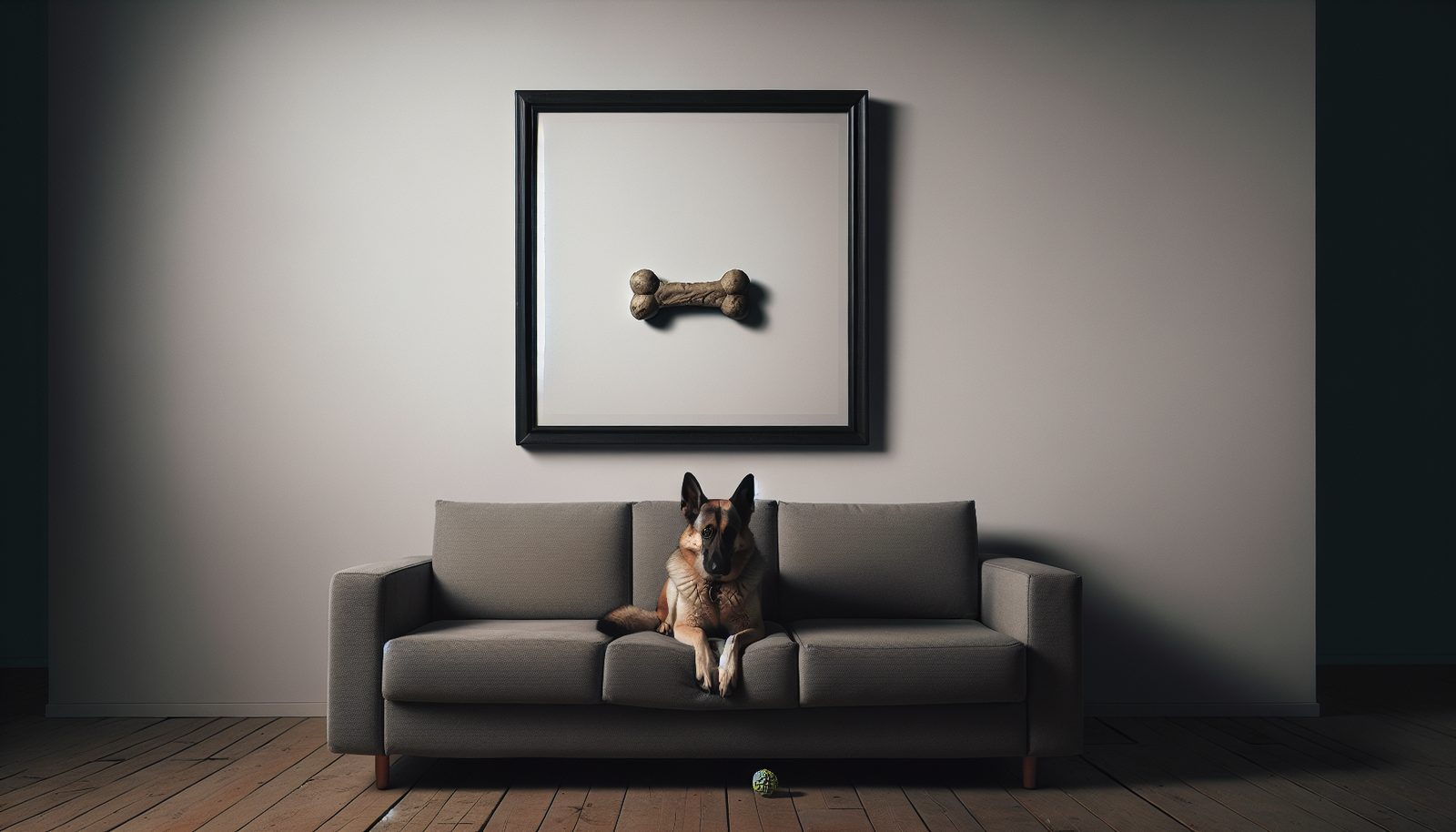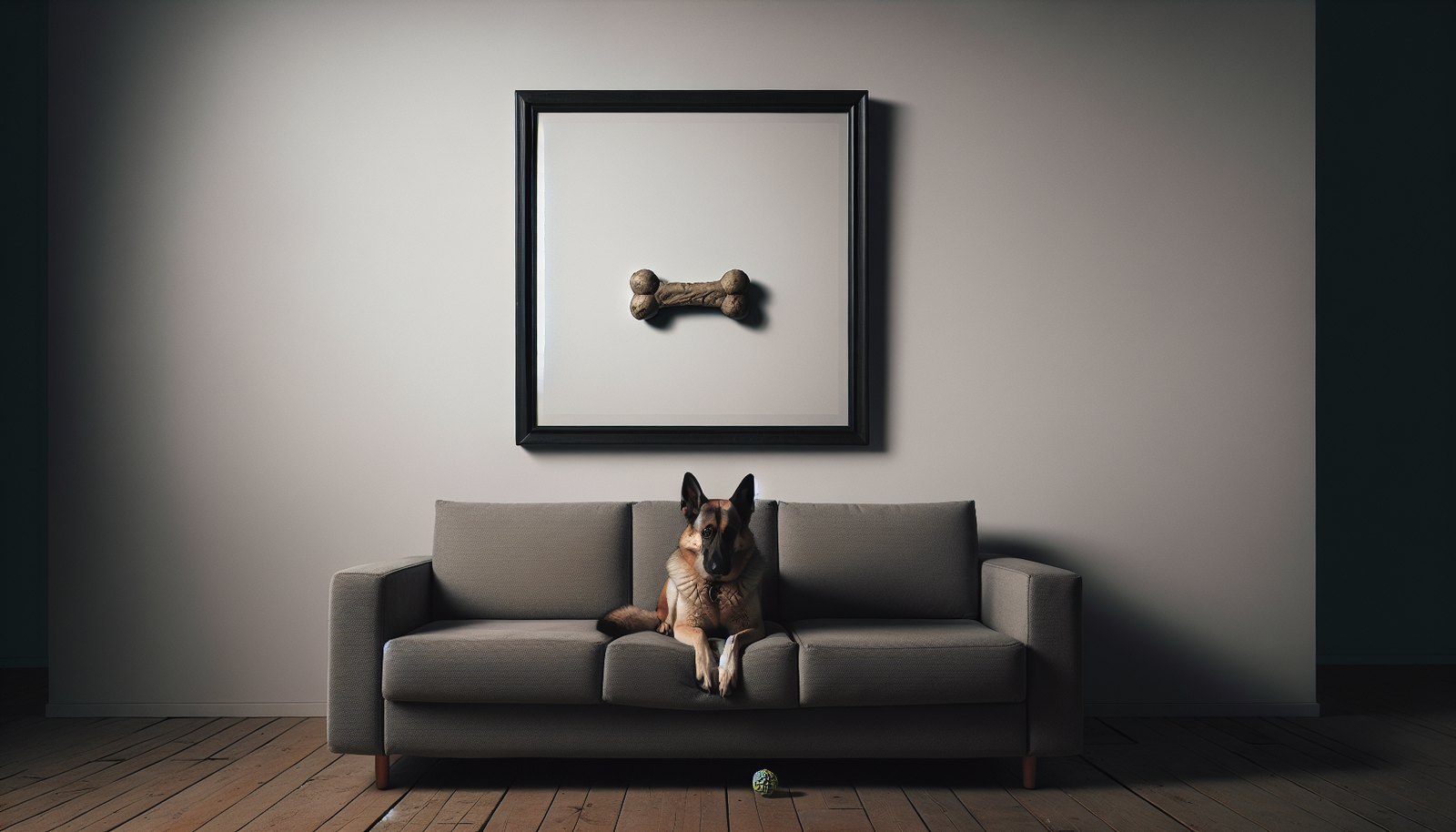Are German Shepherds prone to separation anxiety? If you’ve ever wondered about the emotional well-being of these beloved dogs when left alone, then you’re in the right place. In this article, we’ll explore whether German Shepherds are more susceptible to separation anxiety compared to other dog breeds. Understanding their unique temperament and needs will not only help you provide the best care for your furry friend but also shed light on how to alleviate any potential anxiety they may experience when apart from their favorite humans. So, let’s get started and discover more about the fascinating world of German Shepherds and their emotional health. German Shepherds are known to be a loyal and protective breed, but they can also be prone to separation anxiety. Separation anxiety is a behavioral condition that occurs when a dog becomes distressed or anxious when separated from their owner or when left alone. It can lead to destructive behaviors, excessive barking, and even physical symptoms such as pacing and restlessness. Understanding the factors that contribute to separation anxiety in German Shepherds is crucial in preventing and managing this condition effectively.
Breed Predisposition
German Shepherds have a natural predisposition to separation anxiety. They are highly intelligent and social animals that form strong bonds with their owners. This strong bond, while a positive trait, can also make them more susceptible to separation anxiety. German Shepherds thrive on companionship and can become anxious when left alone for long periods of time.
Lack of Socialization
A lack of socialization during a German Shepherd’s early development can contribute to separation anxiety. If they have not been exposed to various people, animals, and environments from a young age, they may become anxious and fearful when faced with unfamiliar situations or when left alone. Proper socialization is essential in building their confidence and ability to cope with being alone.
Changes in Routine
German Shepherds are creatures of habit and thrive on routine. Any sudden or significant changes in their daily routine can trigger separation anxiety. This can include changes in the owner’s work schedule, moving to a new home, or even changes in the household dynamics. Stability and consistency in their daily routine can help alleviate their anxiety.
History of Abandonment or Trauma
German Shepherds who have a history of abandonment or trauma are more likely to develop separation anxiety. Dogs with past traumatic experiences may associate being alone with feelings of fear and abandonment, leading to heightened anxiety when separated from their owners. Providing a safe and loving environment, along with patience and understanding, is crucial for these dogs.
Genetic Factors
There may also be genetic factors that contribute to the development of separation anxiety in German Shepherds. Some dogs may be more predisposed to anxiety due to their genetic makeup. While it is difficult to pinpoint specific genes associated with separation anxiety, it is important to be aware of the potential genetic influence in this condition.
Understanding the signs and symptoms of separation anxiety is essential in identifying and addressing this condition in German Shepherds. While every dog may exhibit slightly different behaviors, there are common signs to look out for.
Excessive Barking or Howling
One of the most common signs of separation anxiety in German Shepherds is excessive barking or howling when left alone. This barking or howling is a vocal expression of their distress and can be disruptive and distressing for both the dog and the owner.

Destructive Behavior
Destructive behavior is another telltale sign of separation anxiety. German Shepherds may chew furniture, doors, or other household objects when left alone. This destructive behavior is an outlet for their anxiety and an attempt to escape their distress.
Pacing and Restlessness
If a German Shepherd constantly paces or appears restless when left alone, it may be a sign of separation anxiety. They may walk in circles, pant excessively, or display other repetitive behaviors as a result of their anxiety.
Toileting Inside the House
In some cases, German Shepherds with separation anxiety may have accidents and eliminate inside the house. This behavior is not done out of spite but rather due to the overwhelming stress and anxiety they experience when left alone.
Escaping Attempts
German Shepherds with separation anxiety may also attempt to escape from the house or yard when left alone. They may dig under fences, jump over obstacles, or try to squeeze through small spaces in an attempt to be reunited with their owners.
Understanding the risk factors associated with separation anxiety can help owners proactively address and prevent this condition in their German Shepherds.
Age
Age can be a significant risk factor for developing separation anxiety. Puppies are more likely to experience separation anxiety as they are still adjusting to being away from their littermates and mother. Senior dogs may also develop separation anxiety as they may experience cognitive decline and become more dependent on their owners.
Previous Experience
German Shepherds who have had previous negative experiences related to being alone, such as a traumatic event or prolonged periods of abandonment, may be more prone to separation anxiety. These experiences can create a deep-seated fear of being left alone and can exacerbate their anxiety.

Lack of Exercise
A lack of exercise can contribute to separation anxiety. German Shepherds are an active and energetic breed that require regular physical activity to maintain their mental and emotional well-being. Without sufficient exercise, they may become restless and anxious when left alone.
Lack of Mental Stimulation
In addition to physical exercise, German Shepherds also require mental stimulation to keep their minds sharp and engaged. A lack of mental stimulation can contribute to separation anxiety as the dog may become bored and anxious when left alone with nothing to do.
Change in Living Environment
Any significant change in a German Shepherd’s living environment can trigger separation anxiety. This includes moving to a new home, changes in the household dynamics, or even the introduction of a new pet. German Shepherds thrive on stability, and any disruption to their environment can increase their anxiety and susceptibility to separation anxiety.
Preventing separation anxiety in German Shepherds is key to ensuring their overall well-being and happiness. By implementing these preventative measures, owners can help their dogs feel more comfortable when left alone.
Proper Socialization
Proper socialization from an early age is crucial in preventing separation anxiety. Introducing German Shepherds to a variety of people, animals, and environments in a positive and controlled manner helps build their confidence and resilience.
Crate Training
Crate training can provide a safe and comfortable space for German Shepherds when they need to be left alone. By gradually introducing the crate and associating it with positive experiences, the dog can learn to view the crate as their den and a place of security.
Gradual Alone Time
Gradually increasing the amount of time a German Shepherd spends alone can help alleviate separation anxiety. Start with short periods of alone time and gradually lengthen the duration as the dog becomes more comfortable and confident.

Physical and Mental Stimulation
Regular exercise and mental stimulation are essential in preventing separation anxiety. Providing daily walks, playtime, and interactive toys or puzzles helps fulfill their physical and mental needs, keeping them content and less prone to anxiety when alone.
Establishing a Routine
Establishing a consistent daily routine for a German Shepherd can help reduce anxiety. Dogs thrive on predictability, so maintaining regular feeding times, exercise routines, and bedtime rituals can provide them with a sense of security and stability.
Training techniques can be highly effective in helping German Shepherds cope with separation anxiety. These techniques focus on gradually desensitizing the dog to the triggers of their anxiety and promoting positive associations with being alone.
Desensitization
Desensitization involves exposing the German Shepherd to increasingly longer periods of alone time in a controlled and gradual manner. By starting with short intervals and gradually increasing the time, the dog can learn that being alone is not a reason to become anxious.
Counterconditioning
Counterconditioning involves replacing negative associations with positive ones. This can be done by associating being alone with rewards, such as treats or favorite toys. By creating positive associations, the dog will begin to view being alone as a positive experience.
Positive Reinforcement
Positive reinforcement is a powerful training technique that rewards desired behaviors. When a German Shepherd remains calm and relaxed during alone time, they can be rewarded with praise, treats, or playtime. This positive reinforcement helps reinforce the desired behavior and reduce anxiety.
Distraction Techniques
Using distraction techniques can redirect a German Shepherd’s attention away from their anxiety. Providing interactive toys, puzzles, or long-lasting chews can help keep their minds occupied and alleviate anxiety during alone time.

Professional Help
In some cases, professional help may be necessary to address severe separation anxiety. Certified canine behaviorists or dog trainers who specialize in separation anxiety can provide personalized guidance and support. They may recommend additional techniques, such as desensitization exercises or behavior modification plans, tailored specifically to the dog’s needs.
While training techniques and behavior modification are the primary approaches to managing separation anxiety, medications and supplements can also play a role in assisting German Shepherds in their journey towards overcoming anxiety.
Anxiolytic Medication
Anxiolytic medications may be prescribed by a veterinarian for dogs with severe separation anxiety. These medications work to reduce anxiety and can help the dog remain calm and relaxed during alone time. It is important to consult with a veterinarian to determine the appropriate medication and dosage for each individual dog.
Natural Supplements
Natural supplements, such as chamomile or lavender, can have calming effects on dogs and may help alleviate mild anxiety. These supplements are available in various forms, such as treats or drops, and can be used as an adjunct to behavior modification techniques. It is essential to consult with a veterinarian before starting any supplements to ensure they are safe and appropriate for the dog.
Pharmacological Options
In certain cases, veterinarians may prescribe pharmacological options, such as antidepressants or anti-anxiety medications, to manage separation anxiety. These medications can help modulate the dog’s brain chemistry and reduce overall anxiety levels. A veterinarian will assess the dog’s individual needs and determine the most appropriate medication.
Consulting a Veterinarian
Before considering any medication or supplement for separation anxiety, it is crucial to consult with a veterinarian. They can provide a proper diagnosis, evaluate the severity of the separation anxiety, and recommend appropriate treatment options. A veterinarian will also monitor the dog’s progress and adjust medications or supplements as necessary.
Proper Administration
It is vital to follow the veterinarian’s instructions regarding the administration of medications or supplements. Giving the correct dosage at the recommended times is crucial for optimal effectiveness. It is also important to monitor the dog for any side effects and report them to the veterinarian.
Aside from training techniques and medications, there are several management strategies that can help German Shepherds cope with separation anxiety.

Creating a Safe and Comfortable Environment
Creating a safe and comfortable environment for a German Shepherd can alleviate their anxiety. Providing a designated area with their crate, bedding, and familiar scents can help them feel secure when left alone.
Providing Interactive Toys and Puzzles
Interactive toys and puzzles can keep German Shepherds mentally stimulated and occupied when left alone. These toys engage their minds and prevent boredom, reducing feelings of anxiety and restlessness.
Doggy Daycare or Pet Sitters
Enrolling a German Shepherd in doggy daycare or arranging for a trusted pet sitter can be an excellent option for dogs with separation anxiety. These alternatives provide companionship and a stimulating environment, reducing anxiety and promoting socialization.
Hiring a Dog Walker
Hiring a dog walker to visit during the day can help break up long periods of alone time for German Shepherds. Regular exercise and interaction with a dog walker can alleviate anxiety and ensure the dog’s physical and mental well-being.
Calming Products
There are various calming products available that can help alleviate separation anxiety in German Shepherds. These include anxiety wraps, pheromone diffusers, or calming collars. These products work by releasing pheromones or applying gentle pressure, helping to soothe and calm anxious dogs.
Knowing when to seek professional help for separation anxiety is essential to ensure the well-being of the German Shepherd and to address any underlying issues.
Severity of Symptoms
If a German Shepherd’s separation anxiety symptoms are severe and significantly impacting their daily life, professional help should be sought. Severe symptoms may include continuous destructive behavior, self-injury, or extreme distress.
Impact on the Dog’s Well-being
When separation anxiety negatively impacts a German Shepherd’s overall well-being, professional help is necessary. This may include changes in appetite, weight loss, severe anxiety-related behaviors, or withdrawal from daily activities.
Failure of Behavior Modification Techniques
If behavior modification techniques and training strategies have been consistently implemented for an extended period without improvement, it may be time to seek professional help. A certified canine behaviorist can provide a fresh perspective and offer alternative techniques tailored to the specific needs of the dog.
Detection of Other Underlying Issues
In some cases, separation anxiety may be a symptom of underlying health or behavioral issues. If there are other concerning signs, such as changes in eating habits, aggression, or obsessive behaviors, it is important to consult with a veterinarian or certified canine behaviorist to identify and address any underlying issues.
Visit to a Certified Canine Behaviorist
A visit to a certified canine behaviorist should be considered if separation anxiety persists or worsens despite efforts to address it. These professionals specialize in addressing behavior issues in dogs and can provide a comprehensive assessment and tailored treatment plan for the German Shepherd.
Case studies and success stories of overcoming separation anxiety can provide valuable insights and inspiration for German Shepherd owners who are dealing with this condition.
Case Study 1: Bella’s Journey to Independence
Bella, a fearful German Shepherd with a history of abandonment, experienced severe separation anxiety. With the help of a certified canine behaviorist, Bella’s owners implemented behavior modification techniques and gradually increased her alone time. Through a combination of desensitization, counterconditioning, and positive reinforcement, Bella learned to feel more comfortable when left alone and gained independence.
Case Study 2: Max’s Transformation through Training
Max, an energetic and highly intelligent German Shepherd, exhibited destructive behaviors when left alone. By enrolling in a training program tailored to address separation anxiety, Max’s owners learned techniques to redirect his focus and provide mental stimulation. With consistent training and the introduction of interactive toys, Max’s destructive behaviors decreased, and his anxiety was significantly reduced.
Success Story 1: How Luna Overcame Her Fear of Being Alone
Luna, a German Shepherd with a fear of being alone, responded well to desensitization exercises and positive reinforcement. Her owners gradually increased her alone time and paired it with rewarding experiences, such as special treats or engaging toys. Over time, Luna’s fear subsided, and she became more relaxed and content when left alone.
Success Story 2: Jake’s Journey to a Balanced Life
Jake, a senior German Shepherd with separation anxiety, struggled to adapt to a change in his living environment. With the guidance of a certified canine behaviorist, Jake’s owners implemented a routine and introduced calming techniques, such as pheromone diffusers. Through patience, consistency, and professional support, Jake’s anxiety reduced, and he regained his confidence.
Through these case studies and success stories, we can learn valuable insights into the challenges and triumphs of overcoming separation anxiety in German Shepherds. Each dog is unique, and finding the right combination of techniques and management strategies is crucial in helping them lead balanced and fulfilled lives.
In conclusion, German Shepherds are prone to separation anxiety due to their breed predisposition, lack of socialization, changes in routine, history of abandonment or trauma, and potential genetic factors. Understanding the signs and symptoms, as well as the risk factors associated with separation anxiety, can help owners proactively address and prevent this condition. Implementing preventative measures such as proper socialization, crate training, gradual alone time, physical and mental stimulation, and establishing a routine can help prevent separation anxiety in German Shepherds. Training techniques, such as desensitization, counterconditioning, positive reinforcement, distraction techniques, and professional help, can assist in managing separation anxiety. Medications and supplements may also be utilized under the guidance of a veterinarian. Management strategies, including creating a safe and comfortable environment, providing interactive toys, considering doggy daycare or pet sitters, hiring a dog walker, and utilizing calming products, can also aid in managing separation anxiety. It is crucial to seek professional help when necessary, considering the severity of symptoms, impact on the dog’s well-being, failure of behavior modification techniques, detection of other underlying issues, or a visit to a certified canine behaviorist. By learning from case studies and success stories, we can gain insights and inspiration for overcoming separation anxiety in German Shepherds. With the right combination of techniques, management strategies, and support, German Shepherds can thrive and lead balanced, independent lives.

